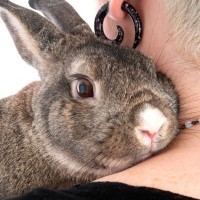Are you adopting a bunny? Congratulations! You’ve chosen a very cute little pet! If you’ve never had a rabbit before, you may be facing a bit of a learning curve, as bunnies are very different from dogs and cats. Here, an Ellicott City, MD vet discusses basic bunny care.
Cage
Make sure your pet has a roomy, comfortable cage. We recommend that bunnies live indoors. Your pet’s cage should be large enough to allow her to sit, stand, run, play, and stretch without tripping over her things or touching the sides or top of the cage. Choose a cage with a solid bottom, as wire floors can be dangerous. You’ll need to add a safe substrate, such as aspen. Avoid pine and cedar substrates, as they are not safe for small animals. Your pet will also need a hide box, dishes, and a water bottle.
Food
Bunnies have very specific nutritional needs. You’ll need to offer your pet lots of fresh grass hay, such as Timothy hay. This should actually be the bulk of your rabbit’s diet. Your furry friend can have commercial pellets for her main meals. You’ll need to supplement these things with fresh produce and, of course, the occasional treat. Ask your vet for recommendations.
Toys
Rabbits have open-rooted teeth, which means that your pet’s choppers will never stop growing. In the wild, rabbits wear their teeth down on tough roots and plants. However, pet bunnies have a much softer diet, so you’ll need to offer your furry buddy lots of chew toys to compensate. Many wood, wicker, and cardboard items are fine. Just avoid anything with sharp edges, small parts, or dangling threads, as well as anything covered in varnish, paint, or dye.
Playtime
Living in a cage can get pretty boring, so your bunny will need time out of her cage every day. Before you let your pet out to play, you’ll need to do some bunnyproofing. Remove or secure toxic plants; plastic bags and wrappers; small or sharp items; chemicals; medications; and personal items, such as shoes and purses. We also recommend using protective coverings on your baseboards and furniture legs, and sealing off openings behind and beneath your furniture and cabinets. Ask your vet for more information.
Do you have questions or concerns about your pet bunny’s health or care? Contact us, your local Ellicott City, MD animal clinic, today!





